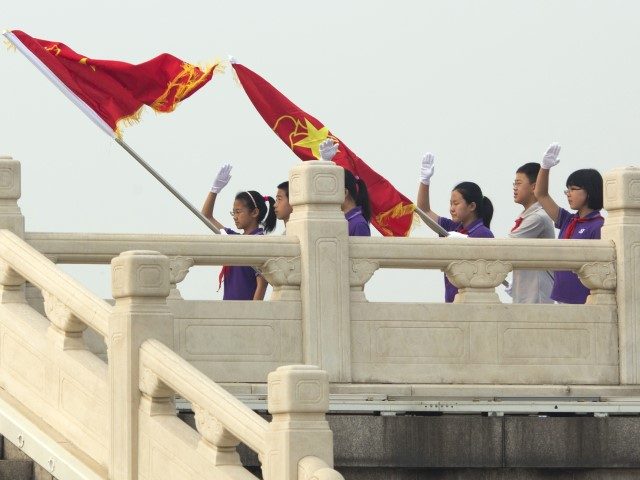The Chinese government propaganda outlet Global Times published an alleged poll of Chinese “Generation Z” youths on Sunday finding that, when the Chinese Communist Party asks them, the group largely favors Chinese authoritarianism over American free government.
“A recent questionnaire survey conducted by the Global Times found that most Chinese young people, especially Generation Z born in the 1990s and 2000s, now view China as more democratic than the US and Western political systems,” the newspaper claimed, “which are no longer considered a ‘role model’ of democracy.”
The Global Times found the results of this supposed poll of Chinese youth a rebuke to President Joe Biden’s “Summit for Democracy,” a series of virtual addresses by leaders of free states that angered the Chinese Communist Party by rightfully excluding it for not being a democracy, and by inviting members of the government of Taiwan. The summit has proven not insignificantly problematic for the Biden administration after the president of South Africa boycotted it – a response to Biden imposing a travel ban on southern African countries – and White House officials allegedly cut the Taiwanese livestream after a map appeared showing Taiwan in a different color than China.
The emphasis on “Gen Z” and its purported loyalty to communism, which the Global Times insistently refers to as Chinese-style “democracy,” follows years of failed attempts to galvanize the generation before it, known as “Millennials,” into supporting the regime.
The Pew Research Center defines Gen Z as people born between 1997 and 2012. It classifies Millennials as people born between 1981 and 1996. Millennials are currently largely in their 30s, an age typically associated with buying homes and starting families. In China, however, the communist regime makes establishing families and maintaining wealth extremely difficult, and for years the government outlawed people from having more than one child. Beijing has since expanded that limit to a “three-child” policy, but marriage and birth rates continue to plummet.
Millennials have taken to opposing communism by refusing to participate in society. Among staple Chinese Millennial cultural trends are “sang culture,” the embrace of defeatist and pessimistic mindsets, and “lying flat,” a philosophy in which Millennials do not aspire to career, personal, or financial achievements in any way.
The Global Times claims its survey found that, when asked by the repressive Chinese regime, most “Gen Z” members rate China’s political system as superior to America’s:
When scoring, from 1 to 10, China and the US in comparing “which country’s political system is better,” the interviewees, on average, gave China a score of 7.5 while the US received a 5. The survey found that 97.2 percent of young Chinese believe that the US’ “summit for democracy” is unable to save “US or Western democracy” from the current crisis.
“The survey finds that most participants, who used to believe in Western democracy (including a multi-party system, ‘one person one vote’ and a tripartite structure) is ‘the only correct answer of democracy for the world,’ have no longer held this view,” the propaganda newspaper asserted. The Global Times also anonymously quoted individuals who allegedly participated in the survey enthusiastically supporting Global Times talking points.
“If ‘democracy’ equals the Western political system, then I disagree that it should be the value shared by humanity,” one alleged survey respondent, “Liu,” told the newspaper. “In Chinese, the word democracy, Min Zhu, consists of two characters – the people and ruling or master. So, if you ask me is the people should be the masters of their country’ [sic] a shared value of humanity, then I would say ‘yes.'”
More egregiously, the Global Times quoted an alleged “Gen Z” member from East Turkistan, an occupied region China refers to as Xinjiang, attacking the United States. China is currently engaging in a genocide of the Uyghur people of East Turkistan fueled by the use of concentration camps and mass sterilization, which two American administrations have confirmed is ongoing. The Global Times did not state if the respondent from East Turkistan was Han, the ethnic majority in eastern China, or Uyghur.
“I don’t think the US has any right to say anything about ‘democracy’ or ‘human rights’ given its previous slaughter of Native Americans and the current blatant smearing of Xinjiang,” the “young man” is quoted as saying.
The propaganda newspaper listed the death of Minnesota man George Floyd, the Chinese coronavirus pandemic, and the January 6 Capitol incident as reasons Chinese “Gen Z” members have no faith in American democracy.
Chinese government propaganda outlets spent much of the past year similarly asserting that China’s “Gen Z” would carry the torch of authoritarianism into the future. In July, for example, the People’s Daily ran a feature about young Chinese fueling a trend known as “red tourism,” in which the regime promotes visits to historic sites to worship communism. The People’s Daily is the official newspaper of the Communist Party of China.
“[M]embers of Generation Z have become the biggest fans of red tourism, accounting for nearly 60 percent of its total consumers,” the outlet claimed. “With the rising sense of patriotism among young people, the number of tourists born after 2000 participating in red tourism has increased significantly.”
“In fact, statistics showed that ticket numbers bought by this group for red tourist attractions through Ctrip in the first half of this year rose by about 2.5 times over the same period in 2019,” the People’s Daily asserted.
In contrast, the Communist Party has spent much of the past five years worrying that Millennials are not sufficiently “patriotic.” Agence France-Presse (AFP) profiled what it nicknamed “Buddhist Youth” in 2017: Millennials with no ambition to enrich communist China.
“I can’t really relate when my friends tell me about their goals and ambitions. As for me, I don’t have any dreams,” one Chinese Millennial interviewed in the piece, Wang Zhaoyue, said.
AFP called the “Buddhist youth” a “positive” alternative to defeatist “sang culture.”
A year later, the Global Times said of Millennials, “they are not inspired by any patriotic drive or the Party’s political catchphrases. They are simply indifferent.”
China began prioritizing the elimination of Millennial sang culture after it hijacked what began as a ham-fisted attempt at Chinese cultural domination this year. Chinese media company Tencent debuted a boy band competition show titled CHUANG 2021 this year designed to create the world’s most popular boy band – a clear attempt to dethrone the South Korean boy band BTS from that position. Beijing had objected last year to a member of BTS thanking U.S. troops for their support of South Korea during the Korean War. (China helped North Korea kill South Koreans during that war, but Chinese “netizens” demanded gratitude from BTS for their role in the war anyway.)
The most popular contestant on CHUANG 2021 became Vladislav Ivanov, a reluctant participant who used the pseudonym “Lelush” and vocally complained that the only reason he was on the show was because he signed a contract that made it impossible for him to leave. Lelush made it to the finals of the competition as voters celebrated his apparent lack of effort, talent, or respect for the competition as the height of sang culture.
“Sisters, vote for him! Let him 996!” one fan joked, mocking the grueling Alibaba company policy of making people work 9 a.m. to 9 p.m. six days a week.
The CHUANG 2021 fiasco preceded a widespread crackdown on Millennial anti-work sentiment online.


COMMENTS
Please let us know if you're having issues with commenting.